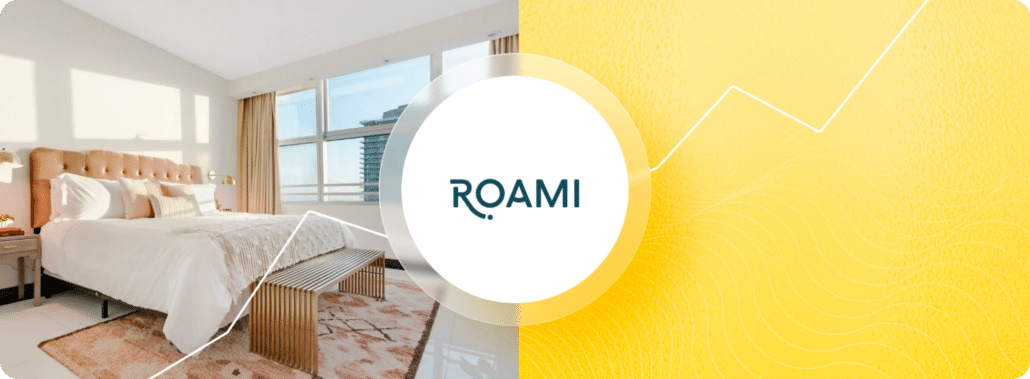Urban operator Roami, formerly Sextant Stays, has more than 500 units across South Florida and New Orleans. They started with 60 units in January 2020 and grew to 360 by the end of the year, then up to 480 by the end of 2021. We sat down with Brandy Canaley, Roami’s Chief Operations Officer, to discuss how they built their tech stack and how those solutions have supported their growth, the role of technology in the hospitality business, and her own advice to property managers on adding software to their operations.
A robust hospitality tech stack that hits every note
Roami’s approach to technology is to use the products that give them exactly what they need. The result is a long list of tech partners and vendors that each provides a specific offering. In addition to Guesty, which is their property management system, they also work with many of Guesty’s 170+ marketplace partners, which integrate directly into the platform. Together, these help Roami achieve their desired outcome, support their growth, and maintain their status as a leader in the industry. Roami’s robust tech stack includes:
Aloware, a modern contact center solution that gives hospitality businesses the ability to engage with guests via cell phone, text message, and social messengers, making guest communication faster and easier.
Autohost, a guest-screening and automation platform that uses machine learning and behavioral checks to create a scalable process for reviewing guests and keeping properties safe.
Breezeway, a property care and operations platform, which helps vacation rental managers and hospitality operators increase their operational efficiency and service properties to the exacting standards that guests and owners demand.
Enso Connect, a dynamic guest experience platform for vacation rentals and boutique hotels that helps hospitality professionals personalize and monetize interactions all along the guest journey.
Into, an AI-powered customer service technology that delivers effortless responses, breaks down language barriers, adapts to tone and mood, and summarizes conversations.
Lynx, a leading keyless and home automation software that works with any locks and smart devices, allowing for improved guest experience and streamlined operations.
Sparrow, an advanced guest reviews solution for seamlessly managing reviews, automating responses, and gaining valuable insights.
Wheelhouse, an intelligent pricing platform that uses data-driven software and machine learning to help short-term rental managers maximize revenue.
Yada, an advanced conversational AI that answers hundreds of questions guests may have — from pre-booking to post-check-out — allowing hosts and property managers to put the majority of their conversations, messaging, and engagements on autopilot.
Because much of their technology is chosen with the goal of providing a better guest experience, Roami considers itself very picky in choosing vendors. Not only that, but they’re also very willing to change products if something else better fits their needs. “My loyalty is to the product that would be best for our business,” Canaley explains.
But she also adds that Roami works with a lot of newer companies and startups, which often change and improve over time. She’s happy to go back to a product Roami has previously used and left, as long as they’ve made significant improvements and can show the value they provide.
While Roami’s list of tech partners is long, some of that comes down to availability and timing. Hospitality operations software wasn’t as widely available when Roami first started as it is now, and Canaley says her own tech stack might look different if she were starting from scratch. In fact, her advice to new property managers is to try to find one software that meets most of their needs.
Choosing the right property management software
When it comes to choosing any new software for Roami, Canaley starts with the problem on hand and works from there to find the product that meets her “must-haves.” She gives a recent example in which Roami was struggling with unclear check-in instructions for their properties. She sent her team to research the various technologies that could help solve the problem until they found one that fully met their needs.
Roami employed this same approach when choosing Guesty as their property management software. When their business model changed, going from mostly single-family homes to almost exclusively multi-family and whole buildings, Roami needed a PMS that could accommodate their inventory type. With several connected units that could be rented out either individually or as a whole, one of their “must-haves” was the ability to recognize and block those units. This was critical, as previously they had to manually catch and block those bookings, leading to double-bookings, strained resources and higher payroll costs, and a lot of human error.
Similarly, multi-unit management was essential to Roami in choosing a software. With so many multi-unit buildings, having the ability to move guests around between identical apartments helped them maximize both occupancy and revenue.

Finding the partner in “technology partner”
While some other large property management companies have opted to go in-house with their technology, building a solution that fits their needs exactly, Roami has shied away from this option. Canaley explains that while she can’t promise it’s off the table forever, building an engineering arm is both expensive and risky, and at least for now they prefer to leave the technology to experts — like Guesty — who have already proved themselves.
When asked whether Roami would change their PMS provider, Canaley laughs. “I have overseen and handled four PMS migrations. . . Guesty is my last stop.”
Guesty’s in-house innovation and ample marketplace connections not only support Roami’s growth, but Roami’s large size also gives them an edge, allowing them to influence the product roadmap of some of the vendors they work with. They’re able to approach a tech partner and say, this is what we need, are you able to give it to us? And because they have so many listings, it makes their relationship with vendors, including Guesty, much more of a partnership, enabling them to develop the features they need.
This contributes to Canaley’s assertion that they’re unlikely to develop in-house tech capabilities anytime soon. Good technology exists, and Canaley would rather focus Roami’s resources elsewhere.
Roami’s quick growth is a big success story, and Canaley, who oversees almost all technology purchases for the company has advice to give to property managers of every size:
- Advice for new operators: Find one software that meets most of your needs. Ask yourself what you’re willing to spend money on, and do your best to find an all-in-one.
- Advice for mid-size operators: Try to project whether a software will grow with you from five to 100 units. This will enable you to stay with the same partner even as you scale. Look for a PMS with a lot of connectivity partners; even if you don’t need them now, you may want to add them down the line.
- Advice for large operators: Take a close look at your tech stack and understand what’s a must-have and what’s a nice-to-have, so that you’re not adding any unnecessary expenses. Additionally, make sure your providers really meet your needs, as migrating a large portfolio involves a lot of labor and associated costs.
Canaley also adds an important piece of advice for hospitality businesses of all sizes, which is to get a holistic view of a software before signing a contract. “Have everybody demo as many times as possible,” she suggests. “Talk to engineers. Request to interview at least three people who have used that software before, and go to conferences and ask people who no longer use the product why they left.”
